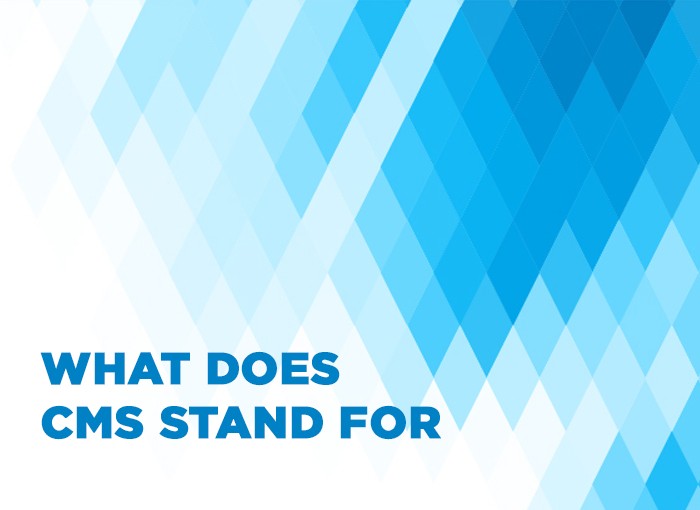WHAT DOES CMS STAND FOR IN MEDICAL TERMS?
Centers for Medicare & Medicaid administers multiple government programs in health care for the public, under the authority of the U.S. Department of Health and Human Services. CMS operates Medicaid alongside Medicare as well as state and federal health insurance and supports CHIP (the Children’s Health Insurance Program). CMS also provides research reports, and data analysis related to potential fraud and helps in preventing million-dollar drain on a system. To deliver quality healthcare programs, it also updates the information related to deductibles and premiums each year.
Understanding the Centers for Medicare & Medicaid (CMS) working
Since 1977 the Health Care Financing Administration operated as CMS within the Department of Health Education and Welfare (HEW). The organization implements multiple health programs across the nation through its efforts to decrease expenses and improve care delivery for its benefit recipients. The agency pursues population health benefits by developing particular payment systems.
The CMS organization maintains patient health records privacy through HIPAA standards for electronic health care data. Increasing healthcare costs increase every year to levels that many individuals cannot afford medical treatment.
The Medicare premium payments come automatically from the Social Security benefits of beneficiaries. CMS maintains a practice of educating the public about health insurance costs yet avoids causing public annoyance. Tax returns determine that higher-income individuals pay higher premiums to Medicare.
How Does CMS Work?
The beginning of CMS began in 1977 as the Health Care Financing Administration (HCFA) ran its functions. In 2001 CMS adopted its current name after being formerly known as the Health Care Financing Administration (HCFA). The healthcare cost management system CMS operates to provide superior quality care services. The organization is related to developing security specifications under HIPAA as patients are forced measures to protect health records. The cost of rising health care is beating many people who are becoming unable to deal with payment.
The CMS organization maintains a continuous flow of updated information about healthcare costs as well as premium payments and insurance deductibles. Social Security benefits operate as the payment system Medicare members utilize to authorize automatic premium deductions. Holders of higher incomes need to pay increased costs because of their tax obligations.
Types of CMS programs
Medicare
- Under Medicare the Federal government offers health coverage to disabled youths and senior citizens who turned 65 and those patients with advanced kidney disease. They may have worked and paid into the system to go for coverage.
- Medicare comprehends Part A, B, C, and D.
- Part A shall indemnify for all reasonable costs of skilled nursing, hospice, inpatient hospital, and home services.
- Part B includes preventive care, outpatient, physician, laboratory, and other services.
- The synergy between Part A and Part B is known as Medicare Advantage or Part C.
- Medical coverage under Part D includes coverage for prescription medications and drugs.
Medicaid
- The Medicaid program is government-sponsored for people with low incomes. It includes many costly and complex needs for care administered at the state level. Medicaid enrollment limits out-of-pocket costs and provides assistance such as hospital stays, doctor’s visits, custodial care costs, and long-term medical costs.
- Patients can apply for Medicaid through their state’s Medicaid Agency or Health Insurance Market.
CHIP
- Through its brief name, the chip stands as a brief form for children’s health insurance programs that expand cheap health insurance benefits for children under 19 years of age. Each state establishes different eligibility rules regarding the program while the income limits vary across different states. Patients should consult the website to find out eligibility rules in order to stay below a 5% income limit.
- The children’s health plan gives free medical treatment to its patients including vaccinations well-child exams and doctor appointments as well as laboratory tests X-ray diagnoses prescription drugs and dental and vision services together with inpatient and outpatient hospital care with emergency services included. Some health programs require patients to make minimal regular payments or payments upon use of services.
Recent Developments
CMS continues to lead the healthcare improvement initiative by improving medical care distribution and developing programs that reduce health expenses. The agency demonstrates technology discipline by improving electronic health records and promoting telehealth services that improve patient healthcare access.
2024 Presidential candidate Donald Trump, Heart Surgeon Dr. to become the next CMS leader. Mehmet Oz was selected. Under his appointment, Dr. Oz will direct health insurance programs serving more than 140 million Americans through Medicare and Medicaid.
CMS’s Role in Healthcare Quality Improvement
Center of Medicare and Medicaid Services serves as a major institute responsible for developing health quality standards in all regions of the United States. Medicare and Medicaid Services Centers have introduced several programs to provide quality tasks under healthcare benefits at prices that beneficiaries can spend.
Quality Payment Program (QPP)
- Merit-based Incentive Payment System (MIPS) adjusts Medicare payments through performance evaluation of quality measures and cost efficiency and improvement activities alongside promoting interoperability standards.
- Advanced Alternative Payment Model (APM) providers earn bonuses tied to assumed accountability for patient outcomes.
Beneficiary Support and Education
Medicare & Medicaid Assistance
CMS provides comprehensive support through:
- State Health Insurance Assistance Programs (SHIP)
- Medicare.gov website
- 1-800-MEDICARE helpline
- Educational materials and workshops
International Influence
CMS’s policies and programs often serve as models for other countries healthcare systems, particularly in areas of:
- Quality measurement
- Payment reform
- Healthcare innovation
- Program Administration
Technology and Innovation at CMS
Digital Health Solutions
CMS has embraced technological advancement in healthcare delivery through:
- Promoting Electronic Health Records (EHR) adoption
- Supporting telehealth expansion
- Implementing digital quality measurement systems
- Developing interoperability standards for healthcare data exchange
The agency’s Blue Button 2.0 program provides safe access to Medicare beneficiaries to its health information through third-party applications.



